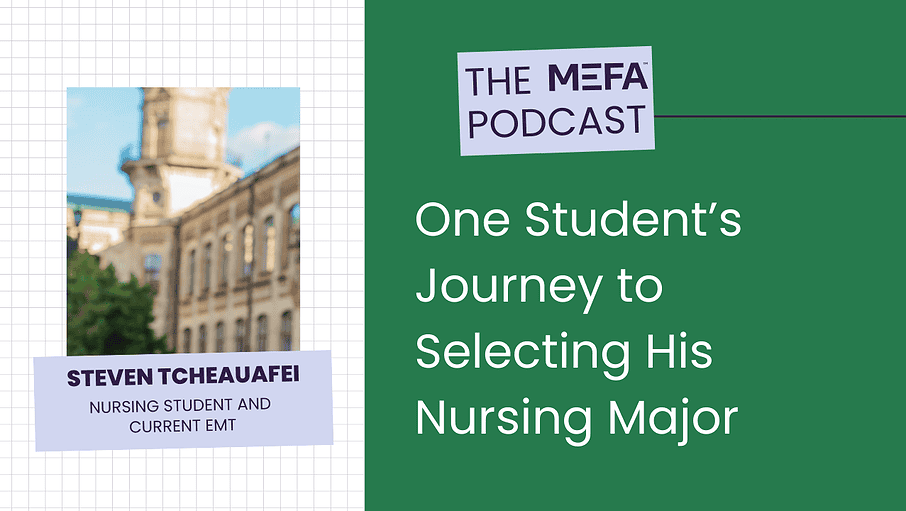

Resources Mentioned in this Episode
Please note that this transcript was auto-generated. We apologize for any minor errors in spelling or grammar.
Steven Tcheouafei: [00:00:00] Last summer, I was actually texting my friend who goes to a different school, and he’s a pre med major, and he wanted patient care experience. And he was thinking about EMT school. And that never crossed my mind before EMT school being a EMT paramedic. Never crossed my mind. And since he brought that up, something sparked in me.
I was like, oh, I could see. This, I could use EMT as a stepping stone to get ahead and help me prepare for nursing, like the field of nursing.
Jonathan Hughes: Hello everyone and welcome to The MEFA Podcast. My name is Jonathan Hughes and today you’re going to hear a conversation that I had with Lyndon Steven Tcheouafei. And this one’s all about career pathways. In particular, it’s about nursing. So if you’re thinking about a [00:01:00] career in nursing and you’re not sure how to get started, what it’s like, then take a listen to the show.
And we also touch on a whole lot of other topics like transferring schools, changing majors, and job shadowing. Now I’ll be back afterwards with a wrap up, but I’ll let him introduce himself.
Steven Tcheouafei: My name is Lyndon Steven Tcheouafei. I’m a sophomore. I am actually a transfer student. I currently go to UMass Lowell, but I transferred from Mass College of Pharmacy.
Jonathan Hughes: Tell me a little bit about yourself. Just generally your life story up to this point.
Steven Tcheouafei: I, as a kid, I always liked everything. I liked trying everything. But, I really was interested or I’m really interested in science, even growing up, I would just read anything science related, but I’ve always liked everything. Played a lot of sports. I was in soccer. I did taekwondo to really early on. Age five for about eight years. I did track in high school.
Jonathan Hughes: Where did you go to high school?
Steven Tcheouafei: I went to Andover high school.
Jonathan Hughes: You’re going through a lot [00:02:00] of the things that we’re talking about as MIFA right now. And so we’re going to talk about your schooling, but you’re an EMT and right now you are studying.
To be a nurse. Is that correct? Tell me about that.
Steven Tcheouafei: Yeah. So I’m not in the traditional like nursing pathway. I started off as a pharmacy major at MCPHS and I transferred to UMass Lowell. Not as a nursing student, but more as an applied biomedical science student, but It will have all the prerequisites for nursing school.
By the time I graduate, there’s a lot of nursing programs that have ABSN program, which essentially is getting your bachelor’s in science and nursing in one year versus the traditional three or four years, because now you’ve had your prerequisites and now you transfer to the nursing program. So that’s the way I’m going.
Jonathan Hughes: [00:03:00] So you started off. At MCPHS and went to UMass Lowell the through line there, of course, is medicine or bio, right? Is that something that you were always interested in?
Steven Tcheouafei: No, actually. I I’ve always liked trying a lot of things growing up. I am. That when it was time to pick major, pick a major, even a college it was a little difficult for me personally, because I liked a lot of things.
I could see myself doing this. I could see myself doing that. But generally speaking, I really liked science. The person who introduced me into the healthcare field is actually my friend’s mom. She’s a nurse anesthetist, a CRNA. I asked her one day if I could come and shadow her and see what she does for work and I really liked what she did at the hospital.
I spent, I think 10 hours [00:04:00] on on that day with her. And I really liked what I saw, and that’s how I solid solidified my journey into the healthcare profession.
Jonathan Hughes: What was it about pharmacy that you thought, let’s see what else isn’t right?
Steven Tcheouafei: For me, personally, it was not the easiest decision to transfer out of MCPHS because it was a six year program, direct entry into pharmacy school.
The one thing that kind of told me that maybe pharmacy wasn’t right for me is essentially the lack of more direct patient contact, I know pharmacists can have some patient contact and they often do, but it’s not in the sense that I would see myself doing as a nurse or even a PA. They’re more hands on.
I feel that they’re more hands on. They’re more at the forefront of the healthcare. They’re not. Behind the [00:05:00] scenes and I just like. Watching the impact that I make on patients. And I think I’ll see that more in nursing.
Jonathan Hughes: When did you start to be in EMT?
Steven Tcheouafei: So last summer I was actually texting my friend who goes to a different school and he’s a pre med major and he wanted patient care experience.
And he was thinking about EMT school. That never crossed my mind before. EMT school being a EMT paramedic, never crossed my mind. And, since he brought that up, something sparked in me. I was like, oh. I could see this, I could use EMT as a stepping stone to get ahead and help me prepare for nursing, like the field of nursing.
Jonathan Hughes: So what’s EMT school like and where did you go?
Steven Tcheouafei: So I went to EMT school in Lowell Pride Star [00:06:00] EMS Pride Star Trinity. I think they combined into one big company. If I had to describe it, it’s A hose of information, just water hose, just lots of information. A lot of knowledge that you should know on the, in the field, a lot of a lot of information that you just need to absorb, but I think.
What really helps is that a lot of the things that we learn is practical based and you can apply it to real life situations and it’s easier to understand.
Jonathan Hughes: Yeah. When I think about being in EMT or experiences that EMTs may have, I think of really intense experiences. Your description of EMT school.
Sort of fits perfectly with that. Are you, first of all, are you still an EMT? And how long did you spend or have you spent as an EMT?
Steven Tcheouafei: Yes. I’m still an EMT. I have been working with with Patriot Ambulance in Lawrence for about seven months now. I also [00:07:00] recently Got hired to be an EMT for my university at UMass Lowell. They have an EMS program, and I started working with them a couple days ago.
Jonathan Hughes: And have you found it good training for nursing school?
Steven Tcheouafei: Yes I didn’t think so at first. I was like, thinking nurses? are more hospital care and we’re more pre hospital care. And at first, when I was going to school empty school, I was struggling to find how this would help.
But where I started to notice that there was a lot of overlap was when I would talk to my nursing friends at MCPHS and a lot of what they learn is what we learn because they would talk about certain things that the nurses would learn, and they would be surprised that I knew some of the answers, and they were like you’re a pharmacy major, where’d you learn all these things like the patient rights stuff like [00:08:00] very intricate stuff, and I told them, oh, I went to EMT school over the summer, and we touched upon those subjects, and they were Impressed.
Jonathan Hughes: So you mentioned being hired by your school, UMass Lowell to be an EMT there. How did you decide, how did you search for a college to transfer out of, I guess MCPHS into UMass Lowell? How did you decide on UMass Lowell?
Steven Tcheouafei: At MCPHS, I had doubts of pharmacy school. I looked on the route of nursing. So I was trying to find a school that would accept me into the nursing program as a transfer student. But I’ve called a lot of schools and a lot of them told me that They don’t accept transfer students into the nursing program. It’s usually a thing directly out of high school. And I was just scrambling, calling a bunch of schools to see if any one would accept me as a [00:09:00] transfer students.
And if schools did have a transfer program, there’s a lot of specific requirements, like I have to complete these classes and have less than 60 credits, and then I can qualify. So 99 percent of the schools that I called. Did not allow me to transfer, but one school, I don’t remember which school it was, told me that I could do a non-traditional route of nursing.
And I asked them, could you explain? And they told me that I could get a four-year degree in a respective healthcare field. And after graduation, I could apply to a nursing program, a nursing school. To get my bachelor in science and nursing in just one year, because I’ve met all the prerequisites and I decided to go with UMass Lowell just because it’s close. It’s a school that’s really close to me. My [00:10:00] mom went to UMass Lowell and yeah, I just thought that it would just be easier.
Jonathan Hughes: And so what was that transfer process like? He said it’s a, it was a tough decision to come to, which I can certainly understand that, but just. The actual work of doing it. Was that difficult or was that fairly easy?
Steven Tcheouafei: It was actually surprisingly pretty easy. It actually was not much trouble. It was just go to your guidance counselor, talk with them get your transcripts from MCPHS, transfer it over and other few documents to UMass Lowell. And it was a pretty smooth process. It wasn’t too difficult.
Jonathan Hughes: And so how has life as a nursing student been?
Steven Tcheouafei: It’s been, it hasn’t been too bad. I’ve. Learn how to manage my time throughout college. My freshman year, it was a little [00:11:00] difficult getting assignments done on time managing work life balance and even school at the same time, but I’ve worked on that and things are starting to be a little easy.
Jonathan Hughes: Are the demands of a student, who’s studying nursing more strenuous than other courses of study, do you think?
Steven Tcheouafei: I think that it depends on the student. If you are motivated to achieve your goals, I think it’ll generally be easier for that student. Because everybody has their strengths and weaknesses.
For example, I’m not the best at math. For example if I were to go to maybe engineering or a physics disciplinary or a discipline it would be challenging for me. But if I was motivated, very motivated, I would work on it, work on my math skills, my physics skills, [00:12:00] and it would be easier for me down the road.
Jonathan Hughes: So you mentioned your first year. Is this your second year then? And then how many years do you have ahead of you? What’s your path going forward now?
Steven Tcheouafei: So my graduation date, my expected graduation date at UMass Lowell is 2026. And there’s one condition, I have to take anatomy two over the summer in order to graduate on time.
Because I graduate in high school in 2022, it’ll just be. three more years now or two more years now. If I do complete anatomy two over the summer, because it’s a prerequisite for the other lab courses at UMass Lowell. So yeah.
Jonathan Hughes: And then is there a hospital time that you have to do there too or no?
Steven Tcheouafei: I don’t believe so. When I was looking at a lot of schools that have that ABSN post back nursing programs a lot of them don’t have prerequisites for hospital experience, [00:13:00] hospital hours, unlike PA school and even med school. But I believe that I could stand out essentially with what I do as an EMT and stand out from other applicants who maybe don’t have any pre hospital or even hospital experience.
Jonathan Hughes: But I’m, it’s impressive that you did the shadowing. First of all, I always feel like that takes a lot of confidence to ask somebody if you can shadow their work. And what was that experience like?
Steven Tcheouafei: It was actually really interesting because I asked if I could shadow her during COVID, during the height of the pandemic, so hospitals were very careful about who to bring in when people could enter. And I was just very lucky. It worked out.
Jonathan Hughes: Were you nervous?
Steven Tcheouafei: Extremely. I, at first I was like, what if they, what if somebody asks me a medical related question, I don’t know the answer to.
Jonathan Hughes: But you weren’t nervous about catching COVID?
Steven Tcheouafei: No I had [00:14:00] to wear very protective masks, like tight seal mask even a face shield, all that. So I didn’t feel that I was that much at risk. And we did a lot of hand washing, a lot of hands in sanitary procedures before going into operating rooms, meeting patients.
Jonathan Hughes: And through all that, it was enough of a positive experience for you to know that’s what you wanted to do.
Steven Tcheouafei: Yeah, it was, I actually really liked what I saw. I could see myself, it was like, I could see myself living. And the hospital essentially, that’s how that’s how much I really liked that experience.
Jonathan Hughes: Ten hours, you’re, it’s not that far from living in the hospital. Is that that’s a typical, that’s, Oh, that’s not atypical, right?
Steven Tcheouafei: No. My friend’s mom would tell me that sometimes she would sleep, they’d have a small room because she would be on call, she would have a [00:15:00] pager. Sometimes there’s a need for a CRNA for a critical patient. They call her and she has to go. She can’t be home. Cause it’d take too long to get to the hospital. So she has a bed, a small room that she could rest.
Jonathan Hughes: Yeah. I’m always impressed. And I, with people who can have that kind of stamina and that kind of dedication to work. So good luck with that. Is there any advice that you would give any students who are considering you know, going to school for nursing, or maybe even, somebody in general who is studying something that they’re not sure that they want to continue on in.
Steven Tcheouafei: I think the most important thing is to do what you’re passionate about. I know it’s a cliche, but at the end of the day, if you are not passionate about something, And you go on pursue go on and to pursue that it might backfire in the future later down the road I think if you are passionate about [00:16:00] something and you put in the time the work and effort I think it’ll be worth it at the very end
Jonathan Hughes: I realize I haven’t asked you anything about finances or financial aid or anything like that So even though we just, I just asked you a perfect ending question any thoughts on that part of the process? Whether it’s transferring from one school to another, or filing financial aid forms, or did cost play any kind of role in your, Decision making process here.
Steven Tcheouafei: I when I was in high school, I didn’t I actually didn’t apply to many schools I only applied to three or four and I really narrowed down my options And I weeded out the schools that were a little too expensive out of our budget And out of those three schools, we were looking at factors like distance housing.
We were also looking at scholarships even. [00:17:00] So when I sat down and talked to my parents, we narrated down even more to two schools, UMass Lowell. Or MCPHS. I actually, yeah, UMass Lowell was actually one of my top three picks. But I decided to go with MCPHS because they gave a really big, gave me a really big scholarship for the six year pharmacy program.
And they also gave me a housing scholarship partial scholarship for housing and that really influenced the decision going from UMass Lowell to MCPHS. I don’t think if MCPHS gave any scholarship or aid or anything like that. I don’t think I would originally be at NCBHS. I think I’d be at UMass Lowell. So it did play a role.
Jonathan Hughes: Wow. That’s interesting. You, they were your top two choices and you hit them both.
Thank you so much for being [00:18:00] on the show and I wish you the best of luck and everything in 2026, hopefully you’ll be graduated and ready to go. And maybe you’ll speak to us again then.
Steven Tcheouafei: Thank you. Thanks for having me.
Thanks so much, Steven. I really enjoyed that and I hope you did too. Good luck to you and folks, if you liked what you heard today and you want to know more from us about planning, saving and paying for college and career readiness, then you can follow the show and you can find us wherever you get your podcast.
And please take a few minutes to rate us and review us. It just helps us to keep doing what we’re doing. And let your friends know if they’re thinking about going to college. Have family or friends that are thinking about going to college and have some questions. Word of mouth really helps us again to keep doing what we’re doing and getting this show out to folks like you.
So I want to thank our producer Shaun Connolly. I want to thank [00:19:00] AJ Yee, Lauren Danz, and Lisa Rooney for their assistance and getting this show posted so that you can listen to it. Once again, my name is Jonathan Hughes and this has been The MEFA Podcast. Thank you.













